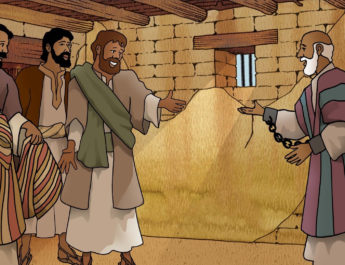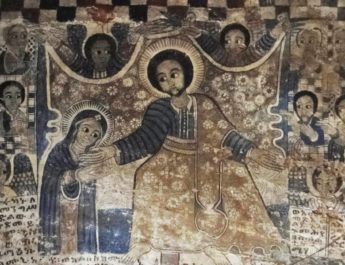Psalm 119:1-8
Ordinary B49
1 HappyA are those whose wayB is blameless,C
A “happy” = esher. From ashar (to go straight, lead, guide; to be level and so to be right, blessed, honest, happy). This is happy or blessedness.
B “way” = derek. From darak (to tread, march, to walk. Can also mean affixing a string to a box since one needs to step on it to bend it in the process; so also an archer). This is a road as a thing that is walked on. Can be used figuratively for the path that one’s life takes or how one chooses to live one’s life.
C “blameless” = tamim. From tamam (to finish or accomplish; to make perfect, demonstrate that you are upright; consume; to complete in a literal or figurative sense). This is entire in a literal or figurative sense. So, it could be complete, full, intact, or without defect. Alternately, it could refer to being sound, having integrity, being sincere or perfect.
who walkD in the lawE of the Lord.F
D “walk” = halak. This is go, come, walk. It is walk literally and figuratively and includes people and animals. It can be used figuratively for one’s moral life – how we walk according to God’s way or against it. It can also refer to the walk of life as in the course one’s life takes, the choices we make, etc.
E “law” = torah. From yarah (to throw, shoot, be stunned; to flow as water so figuratively to instruct or teach). This is law, instruction, teaching, or statute. It can also refer to the first five books of the Bible – the Torah.
F “Lord” = YHVH. From havah (to be, become) or hayah (to come to pass, become, be). This is the name of the God of Israel, the self-existent and eternal one, the tetragrammaton. This pronunciation has been lost to time so “Lord” is generally used in its place.
2 Happy are those who keepG his decrees,H
who seekI him with their whole heart,J
3 who also doK no wrong,L
but walk in his ways.
G “keep” = natsar. This is to watch, guard, protect. It can be positive – preserve or obey. It can be negative as conceal.
H “decrees” = edah. From ed (witness, testimony, recorder); from ud (to admonish, repeat, duplicate, testify, restore, record, relieve). This is testimony or witness.
I “seek” = darash. This is seek, ask, inquire, care for. Generally it means following in pursuit or following as part of a search, which implies seeking or asking. Also used specially to mean worship.
J “heart” = leb. May be related to labab (to encourage; properly, to be encased as with fat; used in a good sense, this means to transport someone with love; used in a bad sense, it can mean to dull one’s senses). This is the heart, courage, one’s inner self, the mind, or the will. Heart is only used in a figurative sense in the Old and New Testaments.
K “do” = paal. This is to do, make, work, or accomplish. Generally refers to regularly repeated or systematic action – so, to practice.
L “wrong” = evel. Perhaps from aval (to deal unjustly, act in a wrongful way, a wrongdoer). This is injustice, wrong, moral evil, acts of violence, or unrighteousness.
4 You have commandedM your preceptsN
to be keptO diligently.P
M “commanded” = tsavah. This is to charge, command, order, appoint, or enjoin. This is the root that the Hebrew word for “commandment” comes from (mitsvah).
N “precepts” = piqqud. From paqad (to attend to or visit – can be used for a friendly or violent encounter; to oversee, care for, avenge, or charge). This is something that is appointed or decreed by God. It can refer to the Law as a whole or a commandment individually.
O “kept” = shamar. This is to keep, watch, or preserve. It means to guard something or to protect it as a thorny hedge protects something.
P “diligently” = meod. Perhaps from the same as uwd (firebrand, a poker). This is very, greatly, exceedingly. It can also mean vehemence, force, abundance.
5 O that my ways may be steadfastQ
in keepingR your statutes!S
Q “be steadfast” = kun. Properly, this means in a perpendicular position. So, it is set up in a literal sense – establish, fix, fasten, prepare. In a figurative sense, it is certainty, to be firm, faithfulness, render sure or prosperous.
R “keeping” = shamar. Same as “kept” in v4. See note O above.
S “statutes” = choq. From chaqaq (to inscribe, carve, or decree; a lawmaker; literally, this is engraving, but it implies enacting a law because laws were carved into stone or metal). This is statute, boundary, condition, custom, limit, ordinance It is something that is prescribed or something that is owed.
6 Then I shall not be put to shame,T
having my eyes fixedU on all your commandments.V
T “be put to shame” = bosh. Properly, this means to be pale, which implies shame, disappointment, or confusion.
U “having my eyes fixed” = nabat. This is to behold, look at intently, consider, or scan. It can mean to have respect or regard someone favorably.
V “commandments” = mitsvah. Related to “commanded” in v4. From tsavah (see note M above). This is a commandment, law, ordinance obligation, or tradition. It is something commanded whether by God or by a human authority. This term is sometimes used collectively to refer to the Law.
7 I will praiseW you with an uprightX heart,
when I learnY your righteousZ ordinances.AA
W “praise” = yadah. From yad (hand). This is to throw one’s hands into the air in a gesture of praise. So, it is to praise, give thanks, or make a confession.
X “upright” = yosher. 14x in OT. From yashar (to be straight, right, even, smooth, or agreeable; figuratively, to make something pleasant or prosperous). This is uprightness, integrity, equity, honest.
Y “learn” = lamad. Properly, this refers to goading (using a pointed stick to guide or prod one’s flock). By implication, it means teaching or instructing.
Z “righteous” = tsedeq. This is rightness, righteousness, vindication. It is everything that is just or ethical. That which is right in a natural, moral, or legal sense. It also includes just weights (i.e. true weights). Figuratively, this is justice, righteousness, equity – even prosperity.
AA “ordinances” = mishpat. From shaphat (to judge, defend, pronounce judgment, condemn, govern). This is a verdict or formal sentence whether from humans or from God. It includes the act of judging as well as the place that judging takes place, the suit itself, and the penalty. Abstractly, this is justice, which includes the rights of the participants.
8 I will observeBB your statutes;
do not utterlyCC forsakeDD me.
Image credit: “Nahal Poleg” in Israel by RG in TLV, 2018.




